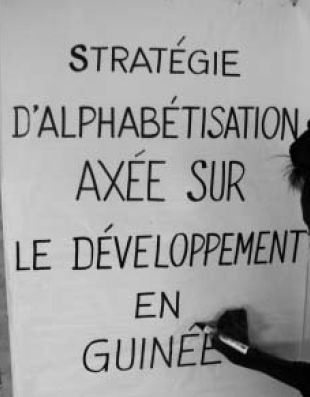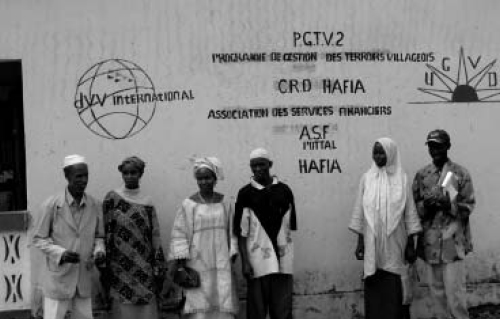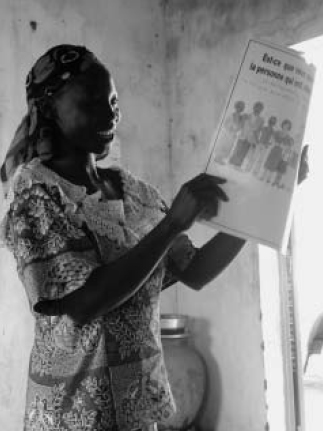In articles about literacy there obviously seems to be an inclination to focus on contextual information, programs, proposals, methods, contents and participants. This impression arises from articles contributed to international conferences and publications in years past. No doubt the references in literacy projects are gener ally there to point out poverty reduction – information which is surely relatively easily gathered.
However, much less information about the monitoring and evaluation of these projects is published, and this has lasting effects. Scarcely documented, as well, are the strengths and weaknesses of cooperation with the respective national services for literacy and non-formal education and their national or local agencies. This is also true as regards reporting of the role of the autonomous community organiza tions and their promotion of local literacy centers. This author believes, however, that the two last-mentioned subjects are important with regard to the search for lasting strategies for local AE.
The author does not plan to make a proposal for such a lasting strategy in this article. But, in particular with reference to the work of DVV International in West and East Africa, some aspects of local development should be brought to light which show the successes and the weaknesses of sustained literacy. The opportunities and challenges of the politics of decentralization pursued in many countries of Africa for over 15 years and the question of the permanent use of reading, posting and computing knowledge should also to be taken into account.
One should remember that in all its projects, DVV International pursues the primary objective of the fight against poverty through the means of adult education. For 40 years this has been its creed. Of course, content, methods and instruments to support literacy change.
In the support of basic activities, DVV International projects deal with specific situations of poverty in generally illiterate target groups, whose self-help abilities, and economic and social competencies should be improved. Thus their participa tion in socioeconomic development should be facilitated and poverty-reducing effects achieved.
The stress is on orientation toward requirements and support for self-help, but the consequences of decentralization for the organization of local AE, perhaps because of their complexity, are rarely brought up for discussion.
A documented example can be found in our contribution to the 2. Selbsthilfe bericht des BMZ (2nd Self-help Report by the BMZ)1 regarding the qualification for cooperation of local action groups, introduced in 1992 for community self-help groups in India. Our partners, PRIA and regional NGOs, in cooperation with the action groups, organized training to assist the functioning of the new institutions, and participated in micro-planning in order to influence local development planning in the interest of the poor and marginalized.
The topic of decentralization was also explicitly embraced by DVV International between 1997– 2002 in a project financed by the European Union for democra tization in Guinea.
The literate environment frequently mentioned at conferences and in project reports seems nebulous to me, since it is cited as a condition for the strengthening and retention of literacy.
Altogether, the topic seems to have been researched very little, or studies are not published and politicians don’t pay attention to the topic. From its nature, it is not substantial subject matter for non-formal educational policy, it is, rather, a topic which overlaps with national language policies.
Several approaches can be identified to deal with this topic.
A widespread opinion is that the national agencies for literacy and the NGOs – that is, the stakeholders of non-formal education – have to create the literate environment. A softer way of stating this is that they have to “contribute to its crea tion”. In a project in West Africa financed by the World Bank, the calculation was less than $1 per learner per year, meaning that, in practice, signs should be made (for example, pointing out the location of the Literacy Center).
The creation of village libraries as a cure for lack of access to reading material for the newly literate is willingly proposed. But who finances and produces new, relevant and interesting reading material? This author knows well from his work in Africa that no literacy program has secure financing beyond its limited model activities.
Entwicklungsorientierte Erwachsenenbildung [Development Oriented Adult Education], December 1995, pp. 119-134.

Literacy course
Source: DVV International
What sounds more realistic is a goal of the new NGO stakehold ers network for non-formal educa tion (Yelen Bulon) in Mali where the literate environment in the national lan guages is enriched. The network would like to achieve this contribution by or ganizing meetings to lobby the vari ous structures that support the pro duction of reading materials, the rural press and radio programs.2
This approach is welcome, because too often the potential of other national services is underestimated; agriculture, forest and fishery, health, environment, and decentralization services which, with their writings, posters, explanatory and information material address the rural population, can thus be understood as part of the developing culture of the literate environment.
The appeal to stakeholders outside of the non-formal education spectrum touches upon, among other things, the huge question of financing. This is true even in Burkina Faso, a country with an amazingly large number of publishers of rural (new reader) newspapers in the national languages. For years, NGOs and small publishers have been waiting for a positive decision for government support of its rural press through national funds for the promotion of non-formal education (Fonds National d’Appui à l’Éducation Nonformelle FONAENF).
This support is announced in statutes. But for many years the Politique Editoriale, which has not been passed by parliament, and which should clarify the question of support for national languages, has been given as the reason for the failure to implement this support, and up to the writing of this article at the beginning of 2009, also for the absence of implementation guidelines.
A large step away from the supply orientation of the first discussion model was taken by the concept Environnement Lettré et Culturel – ELC. ELC has a basic conviction that the newly literate should not only have continuous access to read ing materials, but also the opportunity for constant written communication in their daily lives.
The literate environment is not just the:
“… simple collection of writing factories in national languages, but a process of the continued transition from oral traditions to practices of written communication. It can only be developed by means of regular practice of written communication by the newly literate population and its application in everyday life.”3
ELC provides the instruments for NGOs to take up topics of local interest with literate women and men, specialists in local technical services, and press and radio journalists – for example, to collect oral literature or local knowledge about the environment, medicinal plants, health, and to write down village history.
Of course the work of the ELC also presupposes financing. However, with the newly literate as writers, it can forge an important link between local development and an externally induced literate environment.
Not infrequently, the literate environment is soberly regarded as effectively ap plied knowledge of literacy in everyday private, public and vocational life. From this view, the literate environment gets acknowledgment as a prerequisite for the ability to develop the literate. The application of knowledge goes from the learner via real economic, political and social participation, which, for example, is offered through decentralization and local socioeconomic development.
Over and over again, the literacy traveler meets former illiterates who, with their new abilities, have taken on new roles: as trainers, chairpersons or treasurers in self-help groups, cooperatives and savings institutions, local councils, etc. A literacy circle is formed with other development-relevant training, resulting in individual and joint progress with local government guidance and development planning.
A study by PADLOS Education in 40 communities in West Africa found these correlations:
“It is frequently the literacy and non-formal education projects that gather the scattered available human resources together and prepare them for their new responsibilities.” (p. 82)4

Partner organisation UGVP in Haifa, Guinea Source: DVV International
For the success and sustainability of local development strategies, the utilization (capitalization) of the local competencies and experience is recommended; more over all training should be integrated in such a context, all community planning activities, investments and technical consultation seen as opportunities for learning and as possibilities to transfer responsibility.5 Thus, a rule ensues: There should be no financing of literacy or training that is not coordinated with the other elements of capitalization. The reverse rule is likewise valid: There should not be any external
Partner organisation UGVP in Haifa, Guinea Source: DVV International intervention or investment in local development without a strategy which includes the development of human abilities.
The policy of decentralization offers opportunities to implement this vision. But there is still much experience to be gained along the way, as we can learn from the following three examples.
In November 2008, in Dar es Salaam, the “International Conference on the Challenges of Adult and Lifelong Learning in the 21st Century” took place. It was organized by DVV International East Africa, along with the Institute for Adult Educa tion, University of Dar es Salaam and the Adult Education Department in MoEVT (Ministry of Education and Vocational Training). Among the contributions, one from Uganda and one from Ethiopia were concerned with their respective local adult education contexts.
Dr. Tilahun Workineh, in his contribution, pointed out that in Ethiopia, for ESDP III (Education Sector Development Program) 2005/6 2009/10 for non-formal AE, only 0.56 % was allocated in the budget. Primarily pay for employees and the running costs are covered, not the development and execution of programs. NGOs and local councils and the local population are asked to donate financial support for the expansion of program activities. However, it must be noted that the government generally makes the infrastructure for learning centers available. In the context of decentralization, the responsibility for the organization of literacy and skills training was transferred to the level of the Woredas (districts). One cannot glean how much of the non-formal education budget is used for literacy at this level. A challenge results from the fact that not enough members of the Woreda councils and local education offices are advocates of literacy. The learners are also not active advocates, since they are not included in the planning and the management of the activities. Thus a mechanism is missing for the articulation of learning needs, and the monitoring and development of local ownership.
The nature of the challenge in Uganda is similar, but the options for action and the scope for lobbyists of non-formal education differ in their specifics.
Michael Bazira provided the information that functional adult literacy (FAL) has enjoyed national priority since 2002, recognized in educational policy by the “Na tional Adult Literacy Strategic Investment Plan” (NALSIP). The Ministry of Gender, Labour and Social Development (MGLSD) announced, in its September Policy Brief on Literacy in Development:
“Functional literacy is mainly financed through the Government Poverty Ac tion Fund to the amount of 3 trillion Uganda Shillings, divided in equal parts between the central government and the district administrations. On average, each district receives 20 million USH annually. The Ministry openly stated that the means are insufficient and hardly reach the sub-county and community level.
“A bottom-up planning process in which local needs can find expression is possible because it agrees with the policy of decentralization. This enables learners to participate in planning and lobbying for FAL on the district level. However it creates a gap between the national priority for FAL and the desire for local financing. The cause is partially the bad moderation of the local plan ning processes, but also the pressure from local politicians for visible projects such as wells and schools, etc.
“A strategic goal of NALSIP was to insert local plans of action for literacy into the overriding development plans. NGOs and employees of the decentral ized technical services as well as the members of local councils would have to guarantee that literacy was identified as a priority. It turned out that the political representatives of the local community had very little awareness of the value of literacy. Civil society is thus required to contribute with advocacy and networks to sensitize and prioritize locally. What is recognizable here is that the participation of learners and instructors in lobbying and planning and evaluation sessions strengthens local ownership and contributes to transpar ency. In this sense the organization of associations for instructors (instructor/ facilitator) promises to be a further plus.”
In Guinea, in a different sociopolitical situation, a similar vision was pursued: the accommodation of literacy into the local development plans.6 However, this requires a great deal of sensitization work with the local councils, at best with projects which can be run in parallel. In addition, an internal planning paper of our project in Guinea states:
“Additionally it is to be noted that local projects are coordinated with community councils and state structures and are understood to be part of the local development…
“The participation of learners in decisions concerning their classes is one thing, but beyond a class committee (learners committee or something similar) there should be a community committee which secures the sustain-ability of the center.” 7

Local ownership is achieved:
In the examples from all three countries, the question of local ownership comes down to the learners and the communities. Despite large differences in contexts, scope and the experi ence of local governmental and non-governmental stakeholders, a thread runs through which connects decentraliza tion, sustained literacy, participative development and financing.
Literacy course in Haifa, Guinea
Source: DVV International
For a support organization like DVV International it is clear that support strategy for AE directed at sustainability should not only show successful model projects and their poverty-reducing and social structural effects, but also support AE stakeholders in their lobbying for political educational acknowledgment and financing. Not only in the example of Uganda do we see that this cannot remain limited to the macro level of national policy but must continue all the way down to the district level.
1 Erwachsenenbildung und Armutsbekämpfung, in: Literatur- und Forschungsreport Weiterbildung, 36, Thema:Entwicklungsorientierte Erwachsenenbildung [Development Oriented Adult Education], December 1995, pp. 119-134.
2 Yelen Bulon, 3-Year Plan, Bamako, 2009.
3 Hagnonnou, Bernard, Appropriation d’une Strategie de Création et de renforcement de l’Environnement Lettré en Langues Africaines, p.34, in: Éducation de Base des Acquis pour un développement participatif et durable en Guinée et au Mali: Partage des acquis, Henner Hildebrand (ed.), Castel Editions, Conakry, 2008.
4 Easton, Peter et al., Décentralisation, Autonomisation et Construction des Capacités Locales au Sahel, Florida State University, 1998.
5 Ibid., p. 107.
6 IIZ/DVV Afrique de l’Ouest, Plan de développement local (PDL) Stratégie d’Alphabétisation axée sur le Développement en Guinée, Conakry, 2005, p. 8.
7 DVV International, Strategie de Perennisation d’un Centre d’Alphabétisation, Guide Pratique #11, Conakry, 2008.

DVV International operates worldwide with more than 200 partners in over 30 countries.
To interactive world map